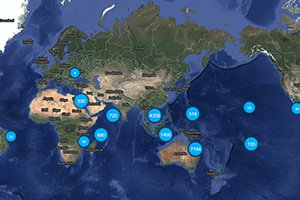CoralWatch
CoralWatch is a non-profit global coral reef monitoring program, working with volunteers worldwide to increase understanding of coral reefs, coral bleaching and climate change.
 The data collected is uploaded to an open access global database, which tracks coral bleaching and reef health trends in 81 countries, making CoralWatch the world’s largest publicly available and easily accessible coral bleaching database.
The data collected is uploaded to an open access global database, which tracks coral bleaching and reef health trends in 81 countries, making CoralWatch the world’s largest publicly available and easily accessible coral bleaching database.
Hosted on the Atlas of Living Australia’s BioCollect platform, the database is freely available for teaching, research, and reef management. An interactive map provides real-time feedback on potential bleaching areas. To date, the database contains 22,410 surveys from 2,402 field sites, representing approximately 17% of global coral bleaching data.
About the research
 CoralWatch aims to create public understanding of the value of reefs and provide opportunities to actively help save the reef through participation in scientific research and education.
CoralWatch aims to create public understanding of the value of reefs and provide opportunities to actively help save the reef through participation in scientific research and education.
Collecting more data on coral bleaching is important for several critical reasons:
- Monitoring coral reef health over time will increase understanding of long-term trends in coral bleaching.
- It helps detect early warning signs of stress before widespread bleaching occurs.
- Reliable, broad-scale data helps governments and organisations prioritise reef protection efforts.
CoralWatch encourages citizen science—getting more people involved helps educate the public about reef health and the effects of climate change. This can lead to greater advocacy, behaviour change, and support for reef protection.
The CoralWatch method has been adopted by scientists and environmental practitioners worldwide. It has been used by organisations such as the Australian Institute of Marine Science (AIMS) and the National Oceanic and Atmospheric Association (NOAA) to monitor the impacts of climate change and reef restoration activities, as well as to assess the environmental effects of dredging and land reclamation projects in Hong Kong, and the Maldives.
Save reefs from home
Climate change is the biggest threat to coral reefs. Collectively the actions we take in our homes, communities and daily routines can account for up to 30% of the emissions reductions needed to stabilise the climate. CoralWatch provides impactful climate actions, strategies and resources to protect coral reefs through the “What Can I Do?" digital platform.
Become a CoralWatch Ambassador
The CoralWatch Ambassador program encourages community participation and fosters a sense of responsibility for reef conservation. Since the program started in 2017, people from all walks of life and geographic locations have become CoralWatch Ambassadors. If you’re passionate about coral reefs, we’d like to hear from you.
Share CoralWatch resources
CoralWatch provides educational materials and workshops to increase public understanding of coral reefs and climate change. The latest science and reef ecosystem information, as well as curriculum-linked materials and lesson plans are available.
Donate to CoralWatch
CoralWatch is a not-for-profit citizen science program. By contributing, you enable CoralWatch to gather vital data, educate the public, raise awareness, and empower communities to protect vulnerable coral ecosystems.
Our people
CoralWatch Team

Diana Kleine
Project Manager

Courtney Morgans
Project Officer

Karen Johnson
Outreach Assistant
Academic Advisory Committee
Dr Nicola Browne
Nicola Browne's research profile
Associate Professor Karen Cheney
Karen Cheney's research profile
Associate Processor Carissa Klein
Carissa Klein's research profile
Associate Professor Chris Roelfsema
Chris Roelfsema's research profile
Dr Tracey Schultz
Tracey Schultz's research profile
Brenda Tournier
Brenda Tournier's profile
